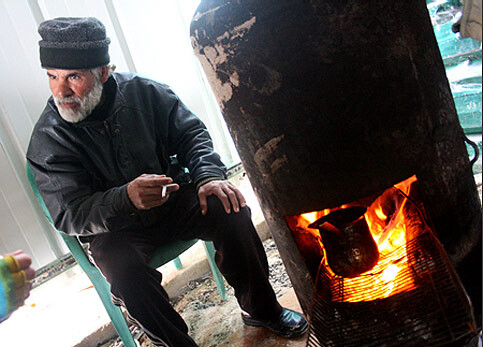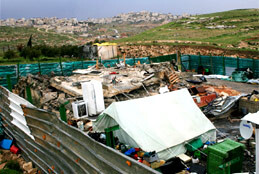The Electronic Intifada 20 March 2007

The Abdullah family is now living in a Red Cross tent after the Israeli authorities demolished their East Jerusalem house. Each night the Abdullahs sit around an old wood burning stove for warmth. (Tom Spender/IRIN)
EAST JERUSALEM, 20 March 2007 (IRIN) - Two months ago, the 12 members of the Abdullah family awoke at 7.30am to find their home in East Jerusalem surrounded by 2,000 Israeli soldiers.
They were hustled out as two bulldozers from the Jerusalem Municipality tore it down — leaving them to face the winter cold with just a canvas Red Cross tent for shelter.
“We have no money to rent a flat here and no relatives who can take us in. Years of saving money and work disappeared in 30 minutes,” said Milouk Abdullah, a 55-year-old scrap-metal dealer.
Abdullah’s house in Al Tur, on the city’s hilly eastern outskirts, was officially demolished because the family built it without a permit — a rule that Israel insists applies equally to everyone regardless of race or religion.
The Jerusalem Municipality and Sabine Haddad, spokeswoman for the ministry of the interior, said the law applied equally to all residents.
In a statement, the Jerusalem Municipality said plans were under way to increase Palestinians’ building rights and build a 2,700-unit neighbourhood for Palestinians in the Givat Hamatos area. It added that many illegal buildings were unsafe and as such constituted a risk to their inhabitants.

The Abdullahs’ tent is next to the mangled wreckage of their house on the outskirts of East Jerusalem. (Tom Spender/IRIN)
Most of those affected move in with relatives, rent alternative accommodation or wind up in camps in the West Bank. Almost their only assistance is emergency ‘house destruction kits’ from the Red Cross, which include mattresses and tinned food as well as a tent.
The Israel Committee Against House Demolitions (ICAHD), a non-governmental lobby group says Israel has since built 90,000 homes for Jews in East Jerusalem, in order, they claim, to maintain a 72:28 percent majority of Jews over Arabs in the city.
Tens of thousands more residents of East Jerusalem live under the threat of becoming homeless — 15,000 buildings in the area are considered illegal and have demolition orders hanging over them, although it is uncertain when or if those demolitions will take place.
Meanwhile, Abdullah has put up a metal structure, with an ancient wood-burning stove, in which he hopes to build a small kitchen and bathroom — but nothing more.
“If we just keep it at that then maybe the Israelis will turn a blind eye. If we make it a home they will just destroy it again,” he said.
This item comes to you via IRIN, a UN humanitarian news and information service, but may not necessarily reflect the views of the United Nations or its agencies. All IRIN material may be reposted or reprinted free-of-charge; refer to the copyright page for conditions of use. IRIN is a project of the UN Office for the Coordination of Humanitarian Affairs.
Related Links
